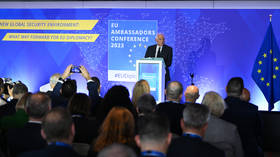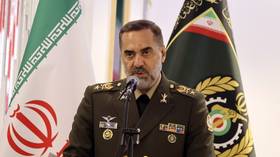EU’s Borrell admits ‘moral failure’ of Western diplomacy

The West bears responsibility for the latest escalation in the Israeli-Palestinian conflict because it neglected to address the root causes of the issue, EU High Representative for Foreign Affairs Josep Borrell has said. He added that he saw no way to end the decades-old struggle militarily.
Speaking during the EU Ambassadors Conference on Monday, Borrell said that the “unfolding tragedy in the Middle East is the outcome of a collective political and moral failure.” He clarified that the failure boiled down to “our real lack of willingness to solve the Israeli-Palestinian problem.”
In light of this, the bloc has an “obligation to be involved,” the diplomat said, adding that Brussels is focusing in the short term on providing humanitarian relief to civilians trapped in Gaza, and in the long term on seeking a “comprehensive and definitive settlement.”
Borrell called for a “humanitarian pause counterbalanced by an access to hostages with the International Committee of the Red Cross (ICRC) as a first step to their release.” He also warned that an “overreaction by the Israelis in the end makes them lose the support of the international community.”
The official went on to say that the conflict has no military solution, adding that even if Israel succeeds in destroying Hamas, it is unlikely to bring peace to the region.
Meanwhile, Israeli Prime Minister Benjamin Netanyahu made it clear on Friday that his country would not agree to a humanitarian pause, and would continue its bombing campaign on the Palestinian enclave with “all of its power” unless Israeli hostages were freed.
Netanyahu’s statements came after he met with US Secretary of State Antony Blinken in Tel Aviv, where the two discussed the humanitarian aspects of the conflict.
Blinken called for “humanitarian pauses with arrangements on the ground increasing security for civilians and allowing more effective and sustained distribution of humanitarian aid,” he said during a subsequent press conference.
Israel has faced criticism from many Arab nations for its large-scale bombardment of Gaza, as well as from Türkiye, Russia, and the UN. Numerous protests in European nations and the US have decried Israel’s actions.
The latest round of the conflict, which was sparked by Hamas’ surprise attack on Israel on October 7, has so far left more than 1,400 Israelis and nearly 10,000 Palestinians dead, with thousands more injured.













